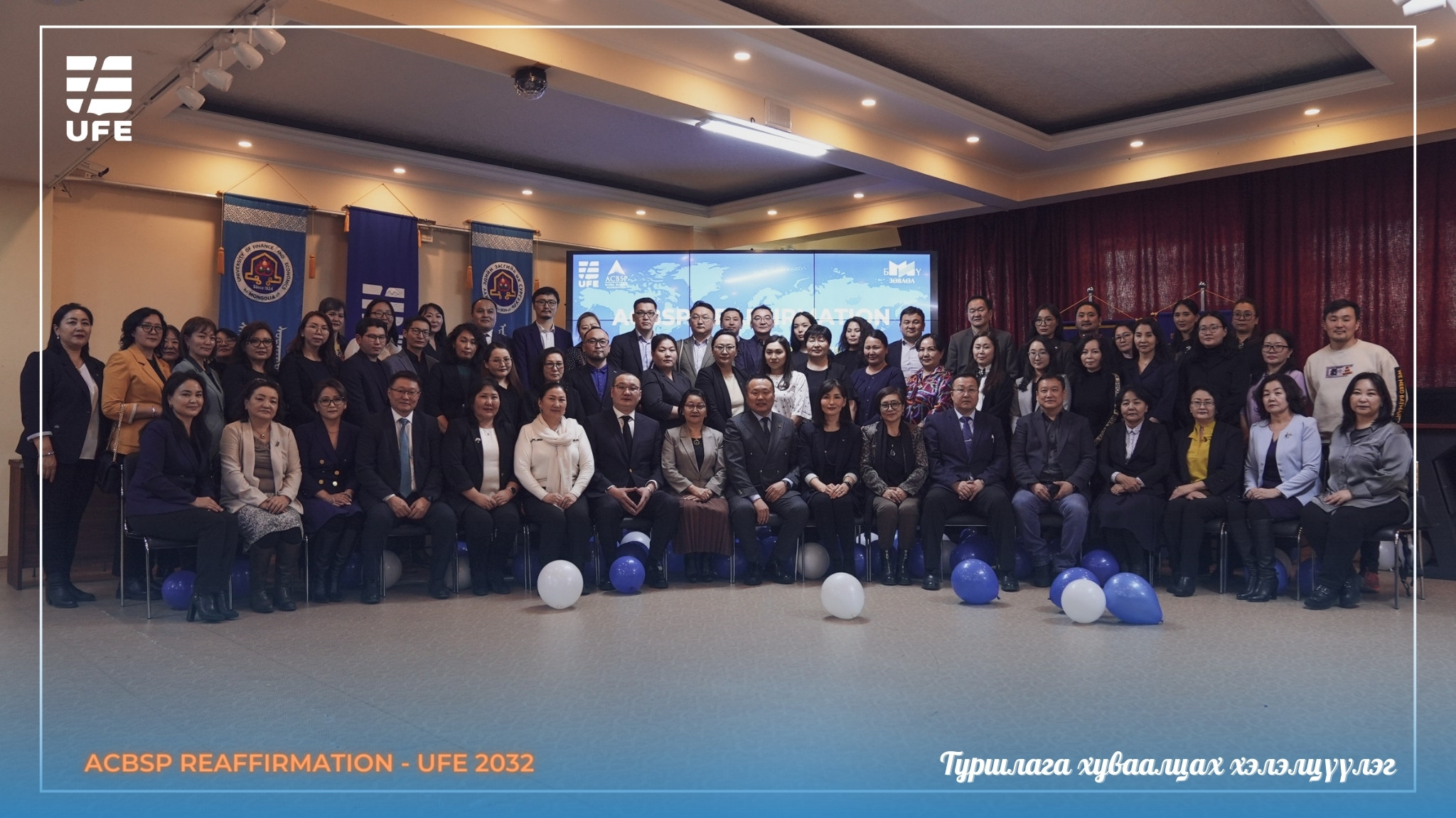The University of Finance and Economics presented its internationally accredited experience to universities in Mongolia

The University of Finance and Economics shared its experience of being accredited at an advanced level by the US Business School and Curriculum Accreditation Council (ACBSP) with universities in Mongolia and exchanged opinions with university leaders about program accreditation, its implementation, and its importance. The "ACBSP Reaffirmation—UFE 2032" discussion was organized on March 17, 2023, in cooperation with the National Council for Accreditation of Education (NCEC), for the purpose of listening and exchanging experiences.
In 2008, UFE became the first member school of the ACBSP organization from Mongolia, and in 2012 it became the first internationally accredited university (initial accreditation). In 2022, UFE's advanced accreditation was reaffirmed until 2032 (Reaffirmation).
The ACBSP is an international organization with more than 1,200 members in 60 countries that have been the first to accredit educational institutions and institutes of higher education and bachelor's and advanced degree business programs for more than 30 years. It promotes the best practices in accreditation worldwide.
In the first part of the discussion, the president of UFE, Munkhbayar.B, discussed the internationally recognized experience in Mongolia's higher education sector, the importance of introducing it to other universities and exchanging experiences, and the improvement of the quality of education for Mongolian universities to enter the international arena together.
Acting on the recommendations of ACBSP, UFE continuously and effectively implements improvements in organizational leadership, strategic planning, stakeholder collaboration, curriculum quality, student academic achievement, learning outcomes, teacher and student career development, teacher knowledge and skills, and governance systems. It was noted that the results of working with the aim of this accreditation exist.
Dr. J. Ariunbold, Deputy Chairman and Director of the National Council for Educational Accreditation, who is co-organizing the discussion, said that there are 22 schools ranked by Quacquarelli Symonds (QS) and Times higher education (THE) in the world, and about two per cent of these schools have entrepreneurial activities. In addition, international conferences on higher education have been held since 1999, and the main theme of the conference held in Spain was DIGITAL UNIVERSITY.
From today's presented example of international-level program accreditation, it is concluded that UFE is not only consistent with the mission but also sees the goal of the next ten years.
B. Munkhzaya (PhD), Vice President of the Undergraduate Program Academic Affairs of UFE, explained in detail the process and organization of re-affirmation.
For example, the process of applying for accreditation, setting up a working group, and preparing the report to send the information was discussed and presented in the instance of UFE. In addition, participants and speakers from 20 Mongolian universities asked questions of their interest and exchanged opinions on details such as how to prepare, things to consider, total organizational costs and so on.
In addition, Professor B. Enkhtuya (PhD) of MUST's School of Business Management and Humanities and S. Erdenetuul (PhD), Deputy Director of Academic Affairs at the University of Humanities, participated as guest speakers and shared their experience of being accredited by ACBSP.
MUST's Business Administration and Management programs were first accredited by the international organization ACBSP in 2013. Since then, they have submitted and evaluated progress reports in 2015, 2017, and 2022 to confirm their accreditation.
In terms of the University of the Humanities, it was accredited by ACBSP in 2017, and based on its recommendations, programs at all levels have been improved according to the concept of outcome-based education.
We would like to express our deep gratitude to the 70 representatives of 20 universities and educational institutions who actively participated in the discussion, as well as to the staff of the National Council for Educational Accreditation who co-organized the discussion.
Participant universities:
- Railway Institute of Mongolia
- Orkhon University
- Ulaanbaatar Erdem University
- University of International Economics and Business
- School of Economics and Business, MULS
- Etugen University
- MIU University
- The National University of Economics
- University of the Humanities
- Business Administration and Humanities University of MUST
- Ider University
- Institute of Education, Culture and Law
- School of Dance and Arts, MNUAC
- Mandakh University
- New Medical University
- Fine Arts Design and Technology School, Ih Zasag University


